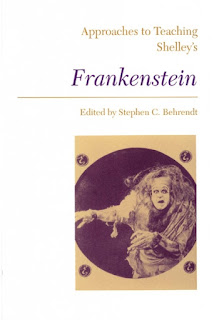Approaches to Teaching Shelley’s Frankenstein
Editor: Stephen C. Behrendt
https://www.mla.org/Publications/Bookstore/Approaches-to-Teaching-World-Literature/Approaches-to-Teaching-Shelley-s-Frankenstein
Pages: x & 190 pp.
Published: 1990
Approaches to Teaching World Literature
ISBN: 9780873525398 (Cloth)
ISBN: 9780873525404 (Paperback)
Description
Mary Shelley’s Frankenstein is both a literary work very much rooted in its age and a cultural artifact that transcends period. “Undeniably one of the great and influential works of the English Romantic period,” writes the editor, Stephen C. Behrendt, the novel provides “an excellent vehicle for introducing students to the complexities of Romantic art and thought.” At the same time, as this volume demonstrates, Frankenstein is often studied in college and secondary school courses focusing not on Romanticism but on science fiction, Gothic fiction, women’s literature, or film and popular culture.
The book, like others in the MLA’s Approaches to Teaching World Literature series, is divided into two parts. The first part, “Materials,” reviews editions of Frankenstein, discusses reference and critical works and recommended reading for students, and lists selected film versions of the novel. In the second part, “Approaches,” instructors present classroom strategies for teaching the novel. The essays are divided into four groupings: general issues (e.g., choosing a text, gender and pedagogy, language and style), contexts of study (e.g., biography, Romanticism), course contexts (e.g., science fiction, women’s studies, composition), and Frankenstein and film.
No contents list available.
Mary Shelley's novel Frankenstein was published in 1818 and, over 200 years later, still remains a profound influence on modern culture. Frankenstein and the Fantastic, an outreach effort of the Northeast Alliance for the Study of the Fantastic and the Fantastic Areas (Fantasy & Science Fiction and Monsters & the Monstrous) of the Northeast Popular Culture/American Culture Association, is designed as a resource for celebrating the text and its legacy.
Celebrating in 2025: the 115th anniversary of Edison’s Frankenstein (1910), the 90th anniversary of Bride of Frankenstein (1935), the 80th anniversary of Dick Briefer’s Frankenstein for Prize Comics (1945-54) and the Frankenstein adaptation in Classic Comics #26 (December 1945), the 60th anniversary of Milton the Monster (1965–67), the 50th anniversary of the film version of The Rocky Horror Picture Show, and the 10th anniversary of Graham Nolan and Chuck Dixon’s Joe Frankenstein.
Subscribe to:
Post Comments (Atom)

No comments:
Post a Comment